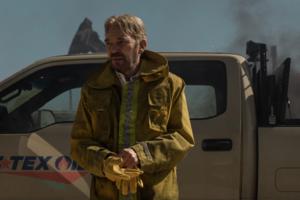Entertainment
/ArcaMax

Scott Derrickson reveals how The Shining inspired Black Phone 2
Director Scott Derrickson has revealed the setting for 'The Shining' directly inspired his upcoming film 'Black Phone 2'.
The 58-year-old filmmaker is bringing back child adductor The Grabber - played by Ethan Hawke - following the success of his 2022 supernatural horror, which was based on the characters featured in Joe Hill's collection of ...Read more

Sammy Hagar: 'The best was yet to come from Van Halen'
Sammy Hagar believes "the best was yet to come" from Van Halen.
The 77-year-old rocker - who was frontman of the 'Jump' band from 1985 to 1996, before returning in 2003 until 2005 - was in touch with late guitarist Eddie Van Halen before his death in October 2020, and was keen to work with him again after learning he was playing the cello and ...Read more

Memory loss and hair falling out in 'clumps': Katie Thurston details impact of cancer treatment
Katie Thurston is suffering memory loss and her hair is coming out in "clumps" amid her cancer treatment.
The 34-year-old star is battling stage four cancer and though she is still feeling optimistic, she admitted there are days when she allows herself to feel bad because having the disease "sucks".
Speaking in a video shared to Instagram, she...Read more

Sir Salman Rushdie has found 'closure' after knife attack
Sir Salman Rushdie is "over" the knife attack which almost killed him because he's found "closure".
The 77-year-old author was left critically injured after he was stabbed repeatedly onstage just moments before he was due to deliver a lecture at the Chautauqua Institution in New York state in August 2022 and he suffered life-changing injuries ...Read more

Aaron Paul calls Bryan Cranston 'the most immature person I've ever met in my life'
Aaron Paul has called prankster Bryan Cranston "the most immature person I've ever met in my life".
The pair starred in 'Breaking Bad' together and they have been firm friends ever since, but Aaron has admitted the Walter White actor used to play a lot of pranks onset and managed to convince him his character Jesse Pinkman had been killed off ...Read more

'I have the urge to ask her if she's OK': Miley Cyrus shares fears for Sabrina Carpenter
Miley Cyrus worries Sabrina Carpenter will get "fried".
The 33-year-old star - who shot to fame in Disney show 'Hannah Montana' when she was just 14 years old - believes young performers should be offered regular therapy sessions and she is particularly concerned about the welfare of singers such as the 'Espresso' hitmaker because of their ...Read more

Ryan Coogler speaks out on potential Sinners sequel
Ryan Coogler says 'Sinners' will not be getting a sequel.
The filmmaker wrote and directed the acclaimed horror movie, which is set in 1932 in the he Mississippi Delta and stars Michael B. Jordan as twin brothers Smoke and Stack who return to Clarksdale wafter serving in World War I and open a juke joint only to be confronted by a supernatural ...Read more

Q&A: Damiano David on his first solo album, his famous girlfriend and that Springsteen moment
LOS ANGELES —Rock-star conspicuous in a brown leather bomber jacket, Damiano David struts into a hotel bar in downtown Los Angeles, finds a table near the back and orders an orange juice in his suave Italian accent.
The 26-year-old singer from Rome broke out in 2021 when his band Måneskin scored a global smash with its cover of the Four ...Read more

Billy Bob Thornton says he wants to be in 'Landman' for years
FORT WORTH, Texas — As “Landman” continues filming Season 2 around Fort Worth, star Billy Bob Thornton says he wants to be in the series for the long haul.
Speaking with Gold Derby recently, Thornton discussed several aspects of the first season and shared a few hints about what Tommy Norris is up to in the second go-around. Cameras have ...Read more

Q&A: Eric Nelsen on '1883,' working on 'The Chosen' and his new Western
FORT WORTH, Texas — Eric Nelsen is a busy guy.
The 33-year-old actor/producer was en route to a Utah airport after shooting night scenes for “The Chosen” Season 6, when he spoke to the Star-Telegram last month. He was gearing up for a flight to Oklahoma City to do press for his new Western, “Trail of Vengeance.”
“From beginning ...Read more

Q&A: Gunna manager Ebonie Ward builds creative hub in Atlanta's music scene
ATLANTA — As a teen, Ebonie Ward had one goal: to be the biggest female manager in the world.
Today, the Atlanta native, who was raised in Gwinnett County, has been living out her dream for more than a decade. As the founder of management firm 11th & Co., which is entirely led by Black women, Ward’s star clients are rappers Gunna and DDG. ...Read more

Christopher Borrelli: How 'Jaws' changed our chumminess with swimming 50 years ago this summer
CHICAGO — Few things in my life have been as consistent as “Jaws.”
I have no friendships as old as my relationship with “Jaws.” It debuted 50 years ago this spring, soon after Memorial Day, and for those of us who spent summer breaks getting wrinkled in water, it ruined the next eight weeks. It was the first movie I saw in a theater (...Read more

Major Glastonbury performer postpones gig due to illness
Sir Rod Stewart cancelled his Las Vegas concert on Sunday (01.06.25) "due to illness" - just weeks before he's due to play Glastonbury's Pyramid Stage.
The 'Maggie May' hitmaker - who was recently put on vocal rest amid his mammoth 'One Last Time Tour' - was forced to reschedule his residency gig at The Colosseum at Caesars Palace, with a new ...Read more

Yungblud talked to ghosts at haunted Idols album recording location
Yungblud talked to ghosts while making 'Idols'.
When the 27-year-old star's American label heard some of the songs that feature on his upcoming album, which is a melting pot of Britpop, classic rock, ballads, and even has orchestras, they didn't get it and tried to dissuade him.
Unfazed, the 'Fleabag' rocker decided to remind himself of his ...Read more

Eiza Gonzalez 'obsessed' with Timothee Chalamet and Kylie Jenner
Timothee Chalamet's ex-girlfriend Eiza Gonzalez is "obsessed" by his new romance with reality star Kylie Jenner.
The 'Fountain of Youth' star was linked to Timothee back in 2020 - three years before he struck up a romance with reality TV star Kylie - and Eiza, 35, has now admitted she's happy to see him "thriving" because the couple look "so in...Read more

Sydney Sweeney has become more 'guarded'
Sydney Sweeney has become more "guarded" since shooting to fame.
The 27-year-old actress has been working in show business since she was a teenager but her fame has increased over the last few years after she landed a high profile role in TV series 'Euphoria' and went on to star in 'The White Lotus', rom-com 'Anyone but You' and Marvel movie '...Read more

Black Phone 2 is 'more violent, scarier, more graphic'
'Black Phone 2' is "more violent, scarier" and "more graphic" than the original film, according to director Scott Derrickson.
The first movie - starring Mason Thames and Ethan Hawke - was based on a short story by Stephen King's son Joe Hill and was released in 2021 with the second instalment now due for release in October - and Derrickson has ...Read more

Sadie Stanley explains why she found it 'very natural' to work with Joshua Jackson on Karate Kid
Sadie Stanley found it "very natural" to work with Joshua Jackson on 'Karate Kid: Legends'.
The 23-year-old actress plays the on-screen daughter of Jackson's character in the what has become the sixth instalment in the martial arts franchise, and thinks that they gelled so well to begin with because he is a father in his own life.
She told ...Read more

Iron Maiden want fans to embrace phone-free gigs
Iron Maiden want fans to embrace phone-free gigs.
The veterans rockers are back on the road again this summer with their 'Run For Your Lives' tour, which kicked off in Budapest, Hungary last week, and prior to the tour's launch their manager Rod Smallwood posted a message on Instagram urging gig-goers to put their devices away so they can fully...Read more

Carole King praises inspirational Taylor Swift
Carole King has praised Taylor Swift as an inspiration.
The 'Cruel Summer' hitmaker revealed on Friday (30.05.25) that she had regained control of the rights to all the songs from her early albums, 'Taylor Swift', 'Fearless', 'Speak Now', 'Red', '1989' and 'Reputation', and the 83-year-old singer-songwriter has joined Taylor in celebrating the ...Read more
Inside Entertainment News
Popular Stories
- Family Guy's Seth MacFarlane turns to alcohol to deal with stage fright: 'I definitely get nervous'
- Debbie Harry reveals poignant birthday plans following the death of her Blondie bandmate
- Alana 'Honey Boo Boo' Thompson says she hardly speaks to her father these days
- Barbie star Michael Cera thinks 'dumb luck' is the reason for his success
- Jason Sudeikis pays tribute to his late uncle and Cheers star George Wendt











